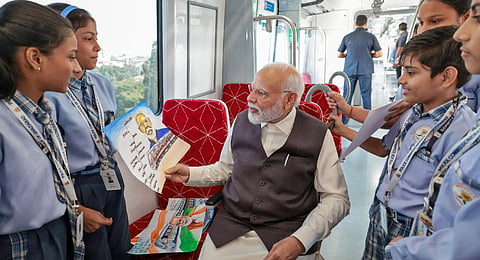

LUCKNOW: PM Narendra Modi, on Friday, said that India is scripting a new saga of growth in every
sector. While inaugurating the 82-km-km priority section of the Delhi-Ghaziabad-Meerut RRTS Corridor, he called it a historic day as the launch of first rapid rail service marked the beginning of a new era in the history of railways.
The first phase links Sahibabad to Duhai Depot, a 17-km stretch on the outskirts of the national capital.
Addressing the public after the inauguration, Modi said, “Today is a historic day for India as the first rapid rail service...has begun...Four years back, I laid the foundation stone of the project. Today, the services of Namo Bharat have started on the stretch from Sahibabad to Duhai Depot. When this Meerut stretch is completed after a year or a year and a half, I will be there at your service.”
India had become the centre of attraction and curiosity across the globe after hosting G20 Summit, he added.
“Today’s India launches 5G on its capabilities and takes it to all corners of the country. Today India does the highest digital transactions in the world...Namo Bharat is also Made in India,” said Modi adding that the screen door system on the platform was also made in India. He stressed that Namo Bharat
was a glimpse of India of the future and exemplified the transformation of the nation with growing economic muscle.
Built at a total cost of Rs 30,000 crore, the RRTS would cut the travel time between Delhi and Meerut via Ghaziabad, Muradnagar, and Modinagar to less than an hour.
Modi called Namo Bharat a symbol of women empowerment.
“On this new train, from driver to the entire crew, all are women. This is the symbol of growing women
empowerment in India.”
He promised to completely change the railway system in the next 10 years.
“The amount of money being spent in India on public transport now has never been seen before,” Modi said. He urged people to take care of the trains. “Treat them like your personal property.”
Meanwhile, UP CM Yogi Adityanath, who was accompanying the PM on the occasion, called it a Navratri gift. “...the most populous state in the country has new infrastructure. This is the effort of the double-engine government that today five cities of Uttar Pradesh have metro rail services. In January, metro rail services will also begin in Agra. The ropeway service is under-construction in Varanasi,” he said.
RRTS At A Glance
• Rapid Rail will connect Delhi, Ghaziabad and Meerut
• The plan for this corridor falls under the RapidX project, and its management
responsibilities will be handled by the National Capital Region Transport
Corporation (NCRTC).
• There will be 5 stations including Sahibabad, Ghaziabad, Guldhar, Duhai and Duhai
Depot, on its route.
• Passengers will be able to buy tickets through mobile and card.
• Special arrangements for patients and divyangjan (differently able)
• A stretcher has been arranged in the last compartment of the rail coach. If a
patient is referred from Meerut to Delhi, then a separate coach is arranged
for this, so that the patient can be shifted at a lower cost. Separate seats have
been prepared for the divyangjan (differently able), which can be folded
when not in use.
• The train will offer Wi-Fi connectivity and mobile USB charging facilities
• According to DPR estimates, the train fare will be around Rs 2 per km. There will
be Rapid Line connectivity on seven lines of Delhi Metro. It will be
connected to Munirka, INA, and Aerocity.
• Under the RRTS project, 24 stations will be built along the entire corridor. The
agency estimates that if the project is completed in 2025, around eight
lakh passengers will be able to travel through it daily. It will take one hour to
reach Meerut from Delhi.